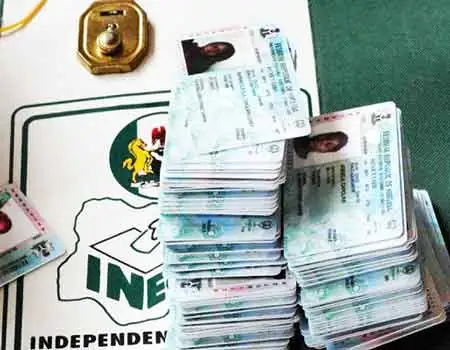

PVCs


Democracy is generally regarded as government of the people, by the people and for the people. In other words, it is a form of government in which the people of a country decide how they want to be governed. As a result, the place of the citizens in democracy cannot be neglected because of the major roles they play in the choice of leadership and governance as a whole. People elect their leaders and representatives through election to represent their interests without compromise. Election is an essential ingredient in any democratic setting and it is one of the distinctive features that distinguish it from the military rule. One vital element that makes advanced democracies in the world to record consistent success is their electoral process which they improve on regularly.
In Nigeria, elections are held into positions and offices at various levels of government, be it local, state or federal government. The Independent National Electoral Commission (INEC) is saddled with the responsibility of conducting elections for the executive and legislative arms, both at the state and federal levels. To enhance free, fair and credible elections, INEC has introduced Permanent Voter Card (PVC). The card is made in such a way that it can be read by a card reader to verify the identity of its holder. Recently, the Resident Electoral Commissioner, (REC) for Oyo State, Barrister Mutiu Agboke, announced that over 600,000 PVCs were still in INEC office yet to be collected by their owners in the state.
According to Barrister Agboke, over 50 INEC Continuous Voters Registration (CVR) centres had been established across the state to cater for registration of those that have not registered before. At this juncture, it is highly essential to appeal to all the owners of the PVCs to go to their local government headquarters for collection before the incoming local government election and next year’s general election. Nigerians who have also attained voting age of eighteen years should utilize the ongoing Continuous Voters Registration to obtain their voter cards.
It is of utmost importance that INEC intensify its public enlightenment to educate voters and potential ones on their rights and responsibilities, vis-a-vis the electoral processes. Relevant stakeholders like political parties, media, civil societies, opinion leaders as well as traditional and religious leaders should complement the works of INEC by passing necessary information to the electorate on what to do before, during and after elections. One of the duties of the electorate is collection of voter cards which should also be kept religiously till the D-day.
The electorate deserves to be informed that someone who relocated to another place, outside the constituency in which he registered cannot vote in his new location unless he transfers his registration. Section 13 of the Electoral Act (2010), as amended, provides for transfer of registered voters. Such a voter has to visit INEC office either at the local government or state to get modulus operandi of transferring one’s data from one location to another. A student who wants to be successful will definitely go to school with writing materials otherwise he will be treading the path of failure. Therefore, a voter who wants to effect changes in governance must have the PVC, failing which such a person must blame himself if charlatans are in control of the government. Let us know that our PVCs are the weapon that can make or mar our future.
The family of Chief Ọbafẹmi Awolọwọ has condoled with the Federal Government of Nigeria and…
The Committee, which is chaired by the Secretary to the Government of the Federation, Sen.…
Deputy Speaker of the House of Representatives, Hon. Benjamin Kalu on Monday expressed excitement over…
The family of Chief Ọbafẹmi Awolọwọ has commiserated with the Ogun State government, Royal Family,…
"The work and recommendations of the committee laid the foundation for the creation of the…
The Edo State Government on Monday, 15th, 2025 secured a ₦1.2 billion education grant from…
This website uses cookies.